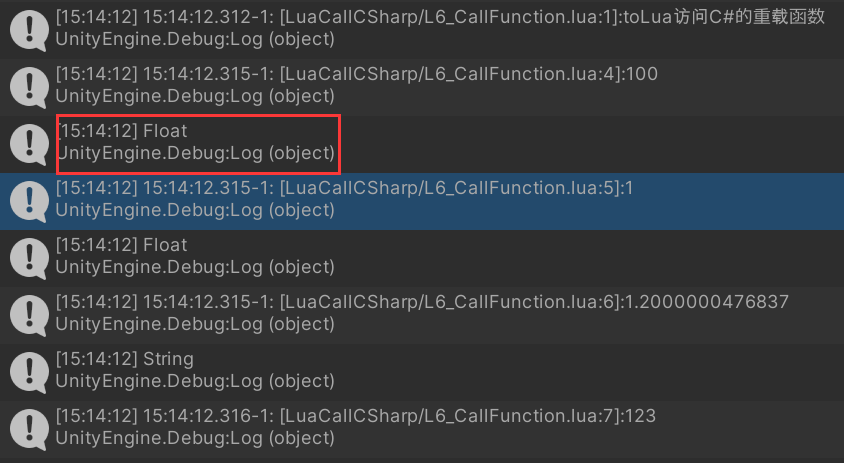UH2S3L15——Lua调用函数(重载)
Lua调用C#的重载方法
假设我们要调用下面的方法
1
2
3
4
5
6
7
8
9
10
11
12
13
14
15
16
17
18
19
20
21
22
23
24
25
26
27
28
29
30
31
32
33
34
35
36
| public class Lesson6
{
public int Calc()
{
return 100;
}
public int Calc(int a, int b)
{
return a + b;
}
public int Calc(int a, out int b)
{
b = 10;
return a + b;
}
public int Calc(int a)
{
Debug.Log("Int");
return a;
}
public float Calc(float a)
{
Debug.Log("Float");
return a;
}
public string Calc(string str)
{
Debug.Log("String");
return str;
}
}
|
数值参数重载精度问题
对于下面的重载
1
2
3
4
5
6
7
8
9
10
11
12
13
14
15
16
17
18
19
| public int Calc()
{
return 100;
}
public int Calc(int a)
{
Debug.Log("Int");
return a;
}
public float Calc(float a)
{
Debug.Log("Float");
return a;
}
public string Calc(string str)
{
Debug.Log("String");
return str;
}
|
toLua和xLua一样,对重载函数的精度支持不太好,lua中只有Number一种数值类型,会导致其分不清该使用何种数值重载,
因此不建议使用不同精度的数值类型重载函数
1
2
3
4
5
| local obj = Lesson6()
print(obj:Calc())
print(obj:Calc(1))
print(obj:Calc(1.2))
print(obj:Calc("123"))
|
可以看见,obj:Calc(1))默认调用了float参数重载

调用out或ref参数重载问题
对于下面的重载
1
2
3
4
5
6
7
8
9
| public int Calc(int a, int b)
{
return a + b;
}
public int Calc(int a, out int b)
{
b = 10;
return a + b;
}
|
toLua会默认调用非out参数的函数重载

如果想要在toLua中使用out重载,有一个固定套路,就是out参数传入nil占位即可
这意味着我们在使用Unity中的一些api中有out时,我们就可以用nil占位了
1
2
| print(obj:Calc(10, 1))
print(obj:Calc(10, nil))
|

但是对于ref重载:
1
2
3
4
5
6
7
8
9
| public int Calc(int a, int b)
{
return a + b;
}
public int Calc(int a, ref int b)
{
b = 10;
return a + b;
}
|
我们就不能传入nil,因为ref参数传入的值必须初始化,但如果不传入nil,就会默认使用不带ref参数的重载
因此,在toLua中,我们无法使用带ref参数的方法
1
2
| print(obj:Calc(10, 1))
print(obj:Calc(10, nil))
|



